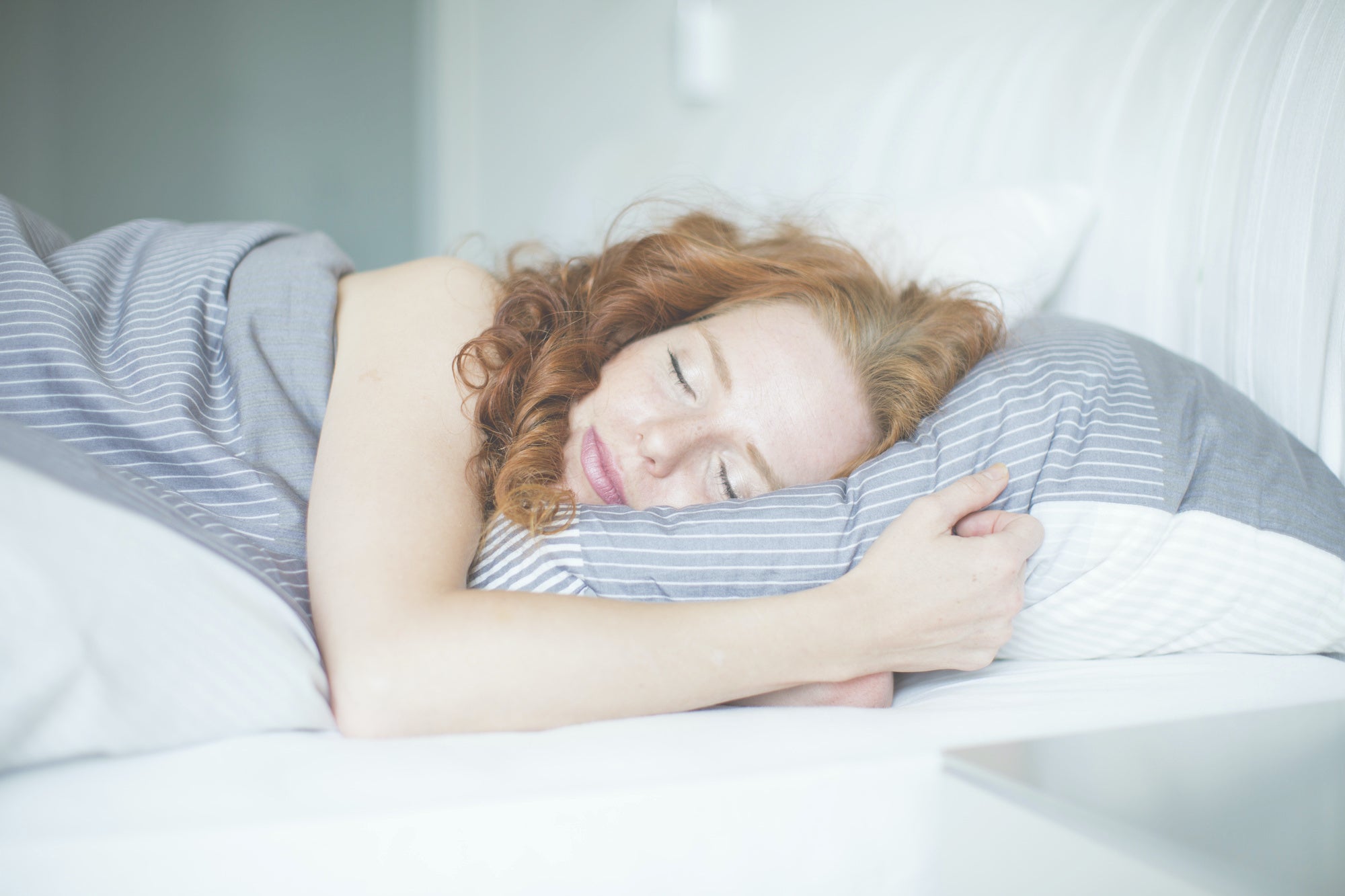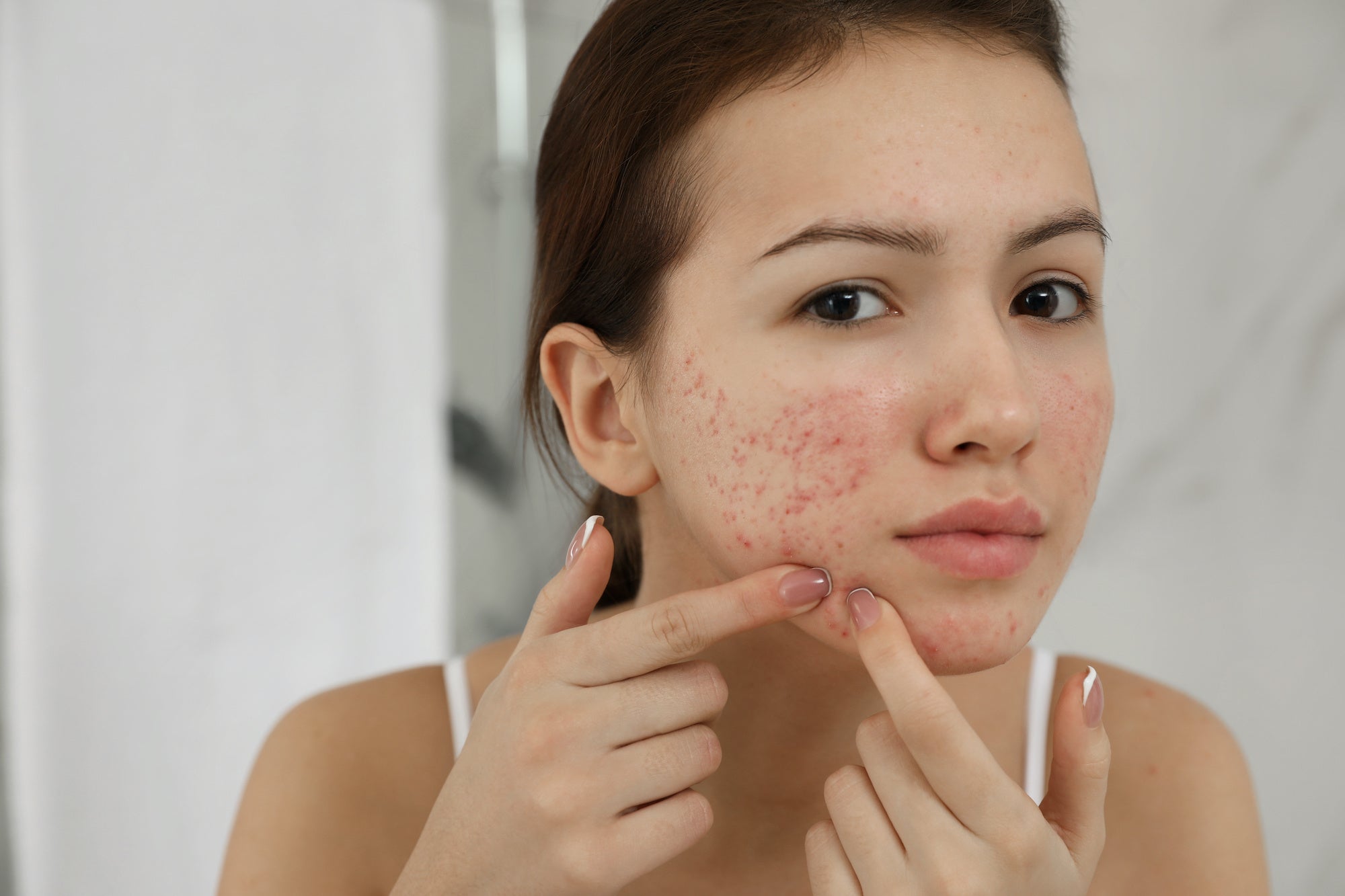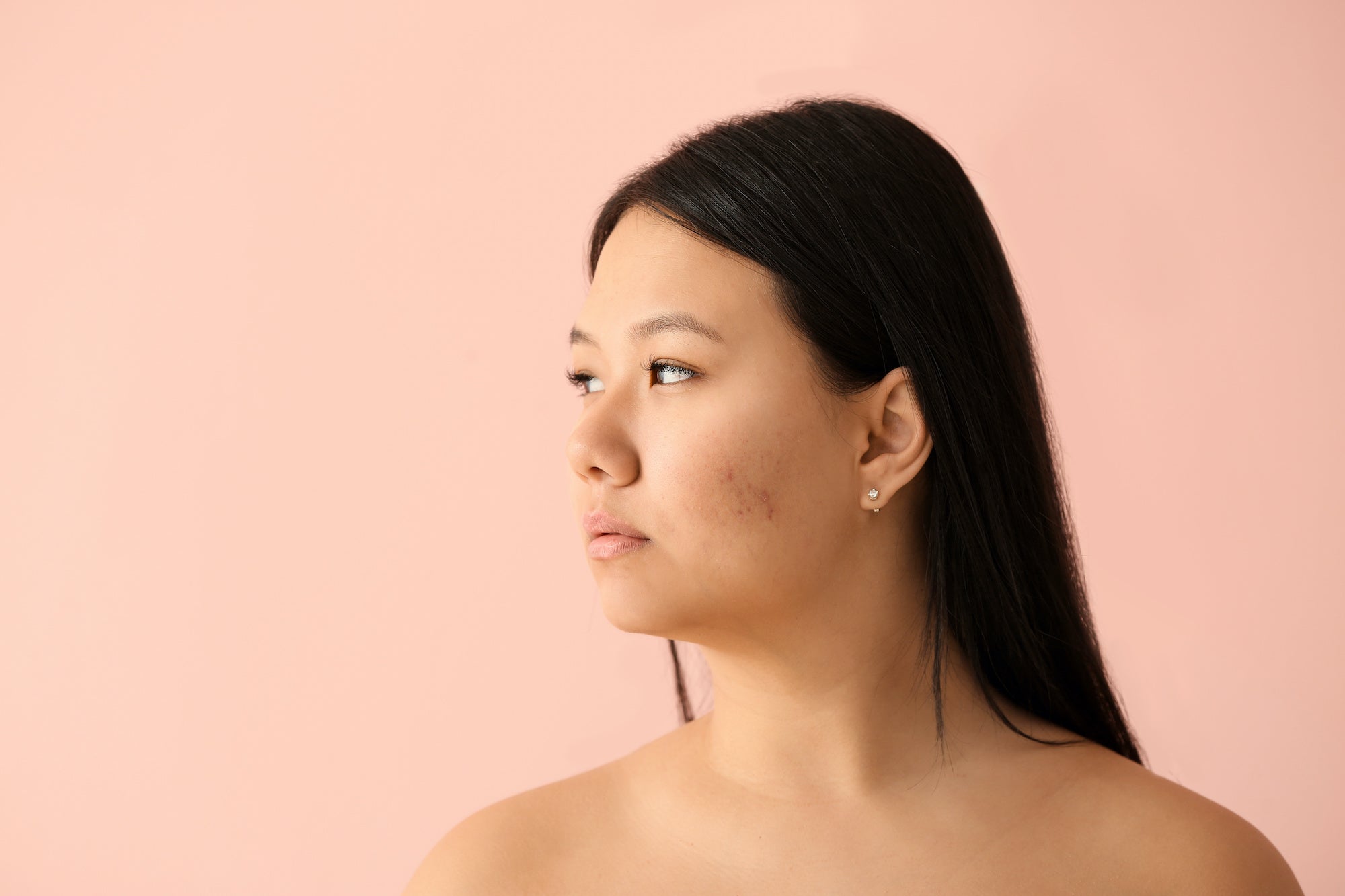
Better Sleep for Better Skin: 14 Tips and Tricks
I love sleep. When I was younger, I’d happily sleep until 1pm. But then, adulthood hit me like a mac truck, complete with distractions, anxieties, and early hours. Suddenly, sleep wasn’t so much a friend as a frenemy.
Sound familiar?
Maybe you’re like me, always able to find something to keep you awake at night, something “more important” or “more interesting” than sleeping. You know, like maybe you desperately need to know the lyrics to “Come On Eileen,” right this very second.
A few low-energy days, and it doesn’t take long for us to start spiraling towards a burnout. And what’s worse, it shows on our skin.
Poor sleep doesn’t just leave you with dark circles (which are bad enough). It can up your stress levels and even interfere with your immune system, indirectly contributing to breakouts!
Enough is enough. We’re tired, we’re cranky, and we feel like we’ve been fighting acne forever. Let’s stop googling old one-hit wonders until two in the morning and start prioritizing our skin, our health, and our sleep cycle.
Better rest is possible with the help of just a few lifestyle tweaks!
#1: Get Some Sun
Counterintuitive, much? But really, go out there and soak up some Vitamin D. (Wearing a responsible amount of sunscreen, obviously.)
Back in the caveman days, there was no such thing as the night shift, so our bodies are hardwired to set our sleep cycles by the sun. These cycles, also known as our circadian rhythms, depend on light exposure to decide when to feel awake and when to start winding down for the night.
In fact, studies suggest that light exposure during the day can reduce sleep disturbances by an hour, and improve sleep efficiency by 13%.
To help regulate your circadian rhythm, try to get some natural light during your active hours. Eat lunch outside, take a walk around the block, or read a book on the porch.
This will help your body distinguish between your waking schedule and your sleeping schedule. Then, when it’s time to hit the hay in your nice dark bedroom, your body will be ready to power down along with you!
#2: Say No to Blue Light
So we’ve established the importance of our circadian rhythm, right? You know bright light can help you feel awake and energized during the day. But what happens if you’re getting a lot of bright light in the evening?
That’s right, it throws your rhythm out of whack.
Maybe you’ve got super bright overheads or an intense set of vanity lights that just won’t quit. Avoid too much exposure to these at night. All this light tells your body that it’s still daytime, and you shouldn’t be sleepy yet.
Plus, it can suppress your production of melatonin, a natural chemical that usually helps you relax at bedtime.
The worst kind of light exposure at night is blue light, like the kind emitted by screens on our televisions, tablets, and smartphones. Blue light emits optical radiation at wavelengths that suppress melatonin big time, even worse than the white light from standard bulbs.
As a result, late-night screen exposure can absolutely wreck your circadian rhythm. After all, your body doesn’t know that you’re literally in bed, scrolling the instant karma subreddit at midnight. It just thinks, “Oh! Daylight!” and tries to keep you awake.
Experts recommend avoiding screen time for an hour or two before bed. Don’t worry, all those new posts and viral videos will still be there tomorrow.
#3: Skip the Caffeine
Y’all are going to think I’ve got some kind of grudge against coffee. After all, this isn’t the first time I’ve cautioned against too much caffeine, especially late in the day.
It’s not like that, I promise! I like a latte as much as the next person, and a peppermint mocha more than the next person. But I also like clear skin, low stress, and, oh yeah, SLEEP.
The facts are simple: caffeine is a stimulant, so it’s super counterproductive to consume caffeine when you’re trying to unwind. You’ll have little luck falling asleep when you’re feeling hyper, alert, and well-caffeinated.
Ideally, you should stop consuming caffeine at least six hours before you go to sleep. For most of us, that’s mid-afternoon at the latest. After that, you should take a pass on the coffee, or the cola, or the energy drinks.
#4: Skip the Nightcap, Too
“Okay, I get it. No stimulants at night. Instead, I’ll have a cheeky cocktail. Alcohol is a depressant, so it’ll help me sleep, right?”

Sorry to disappoint you, but alcohol is also a bad idea.
Turns out that alcohol can worsen snoring and sleep apnea, and interfere with your oxygen intake during sleep. And when your breathing or oxygen flow is disrupted, your rest suffers.
Alcohol can also inhibit our old pal melatonin, preventing your body from smoothly relaxing into a deep sleep.
So that’s no caffeine, no booze, and definitely no jägerbombs. In fact...
#5: Just Skip Drinks Altogether
In my early twenties, I had a friend who was a few years older than me. I used to tease her for always needing to pee. Everywhere we went, she would stop and take a bathroom break, and I would joke about her walnut-sized bladder.
Well, the joke’s on me, because now I understand. Turns out that A) those few years in age made a big difference, and B) I probably never had to pee back then because I was dehydrated all the time.
These days my hydration is better, but I feel like an actual grandma. Because if I don’t use the restroom right before bed, then I’ll be up again at 4am, cursing my lack of foresight. (Can’t relate? Check your hydration and maybe wait until you hit thirty.)
Evidently, this is a wide-spread issue known as nocturia. It may seem like a mildly irritating roll-your-eyes kind of situation, but nocturia can thoroughly disrupt your sleep.
Struggling with constant nighttime pee breaks can even lead to sleep deprivation, causing fatigue, depression, and immune problems.
To avoid interrupted sleep, you may want to stop drinking liquids an hour or two before bed. Of course, it’s also crucial to maintain your hydration levels, so you’ll want to be extra vigilant about your water intake throughout the day!
#6: Bench Press for Success
Exercise, the hobby with a million benefits. Is there any problem that it can’t solve? (Maybe the fact that I hate doing it. Solve that, exercise!)
Even insomnia, the bane of the sleep-deprived, cannot stand against the power of exercise. There are a ton of research studies indicating that exercise can ease insomnia and improve sleep quality.
One study concludes that exercise can reduce the time to fall asleep by 55% and increase total sleep time by 18%.
That said, you don’t want to fill your exercise quota right before bedtime! Exercise makes you more alert, releasing compounds like adrenaline that will make it tough for your body to settle down.
Instead, try hitting the gym or going for your run earlier in the day, when you could probably use the extra energy boost!
#7: Reconsider Nap Time
Are you lucky enough to have time in your schedule for a regular nap? First of all, I am so jealous. Tell me your secret! (Do you live in Spain? Is that it? You get to have a nap because you siesta?)
Or maybe you’re a student, a stay-at-home parent, or you work from home. If you have the flexibility to squeeze a nap into your day, more power to you.
But if you love a good nap, yet struggle with insomnia at night? It may be time to reconsider that siesta, friend.
Napping can actually end up causing increased sleepiness during the day, especially if you experience disrupted sleep at night. Instead of experiencing the deepest, most restful forms of sleep, your body becomes accustomed to intermittent periods of light sleep, which are not as revitalizing in the long-term.
In college, I used to nap regularly — if you can call falling asleep for four hours a nap. Was I still tired all the time? Yes. Did it disrupt my sleep cycle? Probably. Naps helped me stay up late playing Final Fantasy, but definitely did not help me get up for my 8am psychology seminar.
Unfortunately for me, the effectiveness of napping can also depend on the length of the nap. If your little snooze is less than 30 minutes, it’s more likely to promote wakefulness and improve your focus. But if you regularly nap for much longer, it can instead lead to adverse health effects.
Whoops, guess those four-hour naps will definitely stay a thing of the past!
#8: Keep a Sleep Schedule
Once you’ve worked out your ideal nap arrangement (or lack-of-nap arrangement), you’ll also want to set yourself up for success with a consistent sleep schedule.
And I mean consistent. If you want to fall asleep at 11pm every night, you need to convey that message to your body by actually going to bed at 11pm every night.
Having a steady sleep schedule will improve the quality of your rest in the long-term, and make it easier for you to follow your bedtime and wake-up goals.
Not sure what your ideal schedule should look like? Have a little fun investigating your chronotype — a.k.a, what kind of sleep and activity schedule your body is naturally predisposed to follow.
#9: Try a Little Mindfulness
Clear away the distractions and calm your mind with a few minutes of quiet focus. Relaxation techniques can significantly improve the quality of your sleep!
The best thing about this tip is how customizable it is. Mindfulness can manifest itself in all sorts of ways, depending on your preferences and lifestyle.
MINDFULNESS PRACTICES:
- Do some breathing exercises
- Listen to calming music
- Follow a meditation or visualization (there are a ton available for free on Youtube)
- Devote some time to your spiritual practices
- Read a book (but don’t get too sucked in!)
#10: Wash the Day Away
Usually default to a rushed morning shower? Try switching it up and indulging in a relaxing wash at the end of your day, instead!
Taking a warm shower or bath before bed can result in improved sleep quality. It can also help you fall asleep faster. Even soaking your feet in hot water can be enough to do the trick!
Bathing at night can even be a way to kill two birds with one stone if you use this peaceful alone time to practice your mindfulness. Instead of hurrying through an efficient scrub, take this chance to practice self-care and let your thoughts calm.
Personally, I like to pamper myself a little with Averr Aglow’s skin-brightening Rejuvenating Essence Body Polish, focusing on the simple, relaxing task and forgetting about my worries.
Or, if I get the opportunity to enjoy a bath, I’ll apply the nutrient-rich Illuminating Essence Exfoliating Mask while I soak my stress away.

#11: Perfect Your Sanctuary
Of course, all the warm baths in the world aren’t going to help if you’re trying to sleep in total chaos. Your sleep environment is an important factor in the quality of your rest.
Your bedroom shouldn’t just be another room in your house, it should be your sanctuary. A place dedicated to rest and rejuvenation!
Part of this is psychological. You need to associate your bed with sleep and calm. The key here is work-life balance: don’t use your bedroom as a place to binge-watch TV, or map out your to-do list, or work from home. Keep your sanctuary sacred.
You can also optimize your bedroom through the physical environment. A few of the variables that can make or break your household haven:
- Noise: Surprising no one, noise can ruin your sleep and sanity. It can even increase your stress while you sleep! If ambient noise is a problem in your bedroom, consider white noise apps to wash out the disturbances.
- Temperature: Believe it or not, the heat in your bedroom can disturb your sleep even more than noise! If your bedroom is too hot, it can make your sleep restless and inefficient. Try turning on a fan, or reducing your thermostat a little. Start at 70 degrees Fahrenheit and adjust until you hit the sweet spot!
- Light: You’re already avoiding bright light before bed (I hope), but don’t forget ambient light in your bedroom. Is that night-light glaring right into your eyes? Does your neighborhood have really aggressive street lamps? Consider curtains, and covering or unplugging unnecessary lights in your room.
#12: Step Up Your Mattress Game
Now, this is a big step, and maybe not necessary (or feasible) for everyone. Mattresses aren’t cheap! But if you feel physical discomfort when trying to fall asleep, or are left feeling achy when you wake up? You may need to turn a discerning eye towards your bedding.
Ever sit in an uncomfortable chair for 20 minutes, and suddenly your butt’s numb? Imagine the effect a mattress can have after you’ve been lying on it for hours! The surface you sleep on can directly impact the quality of your rest, even inflicting sore joints, stiffness, and back pain.
No way you’ll sleep easy with all that going on!
Finding the right bedding may improve sleep quality by 60%. Taste in mattresses can vary widely (and let’s be honest, we don’t always pick what’s actually best for us). Your wisest option is probably to consult your doctor or physical therapist for a professional opinion.
#13: Supplement Your Sleep
Supplements aren’t everyone’s cup of tea. But there are tons of varieties available at ye olde Vitamin Shoppe, for every health issue from acne to — you guessed it — trouble sleeping. If our other tips haven’t improved your stubborn sleep problems, then supplements may be worth a try.
As you might guess, melatonin is a popular choice to help regulate sleep. Another option is magnesium, which may slow natural sleep disturbances associated with aging. Bonus: magnesium can also help as a mood stabilizer.
#14: Unwind With a Routine
Last but not least, here’s a little psychological hack for you. Heard of Pavlov’s dog? Well, you can call this one Pavlov’s bedtime.
Essentially, you want to establish a consistent night routine. By following the same steps every night, you can condition your body to recognize that you’re getting ready for bed and react accordingly.
For example, my routine goes something like this:
- Close down the house (while my cat begs loudly for food)
- Put on the next episode of a relaxing podcast
- Check tomorrow’s weather and lay out clothes
- Change into my alpaca-print pajama romper
- Unwind with my Averr Aglow PM regimen: first the Clarifying Hydration Dew, then the Radiant Cleansing Nectar, then full-face or spot treatment with the Clear Skin Elixir
By the time I pretzel myself into bed with my husband and the two cats, my body has gotten the message and is ready for slumber.
Now, you can these tips a few at a time, find what works for you, and then use them to build your OWN nighttime routine! (Alpaca jammies optional.)





